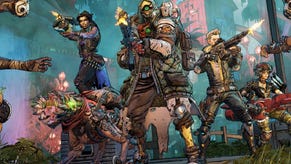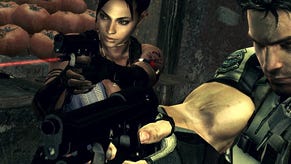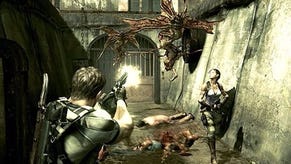Tech Comparison: Resident Evil 5 PC
Breathing new life into the undead?
Months after the debut of Resident Evil 5 on console, Capcom has finally seen fit to unleash the PC rendition of its latest survival horror epic. Nearly anyway - it's out next month. Built upon the same Framework MT engine that powered its previous cross-platform efforts such as Devil May Cry 4 and Lost Planet, it effectively allows the enthusiast gamer to take hold of the standard-setting visual assets of the original console versions and transplant them into the PC realm where graphical quality is limited only by the amount of money in your wallet and the processing and rendering power it buys you. It's an intriguing opportunity to check out one of the most popular console games of the year running at the very limit of its graphical potential.
If you're curious about how well the game runs on your particular set-up, Capcom has made available its own benchmarking tool, which serves not only to show you how well the game runs on your specific PC set-up, but also acts as an "unplayable demo" if you will, covering several segments of gameplay along with one of the RE5's most memorable cut-scenes. We talked about it in-depth in a blog post a while back.
So, just how much of an improvement is the final PC code over the existing console games? Let's roll out the comparisons, kicking off with a couple of very different screenshots. The aim of the exercise here is to compare Resident Evil 5 on PC to the better of the two available console versions (that'll be Xbox 360 then, as discussed in the original Face-Off) but with a twist: the new computer version is set to run at native 1080p, while 360 is configured to run at a comparable upscaled resolution. It's an interesting test to carry out, especially as the Xenos GPU scaler tends to produce excellent results on well anti-aliased images (RE5 on 360 uses a variable AA solution depending on load... if there's processing power to spare, it'll do full-on 4x multi-sampling AA).
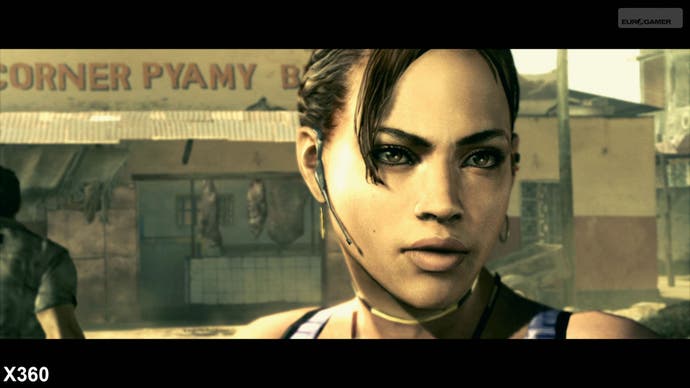
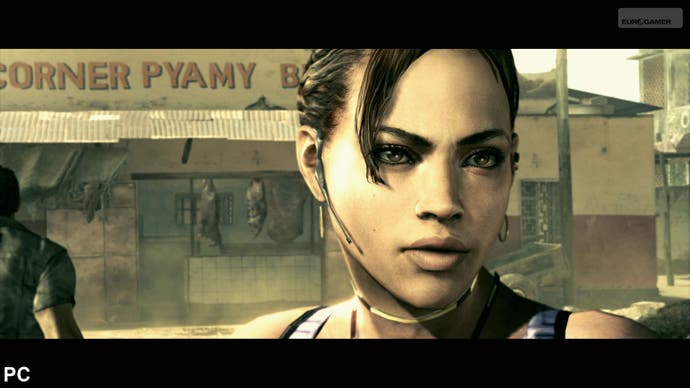
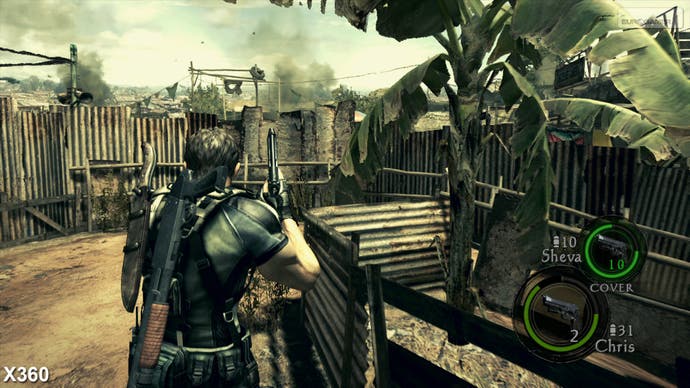
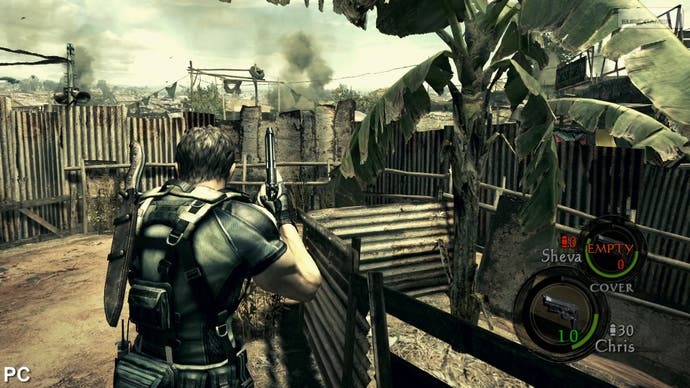
As you can see, the first shot, based on the heavily post-processed cut-scene, reveals little difference aside from a somewhat dialled-back blur effect. There's additional detail resolved in Sheva's skin in particular, but not much else to make the PC version considerably superior. However, moving to the bottom set of images based on general gameplay, we get a better idea of the kind of additional detail unfettered 1080p can offer.
For more direct comparisons, there's a whole raft of screenshots available in our comparison gallery, while for those hoping to see how the games look in video form can check out this HD head-to-head on Eurogamer TV. The video is cropped to 720p (but not downscaled), and slowed down to retain clarity. This helps out in terms of comparing overall image resolution, but in many respects, it is also somewhat counter-productive too.
While the screenshots give some idea of the additional clarity a well-specced PC can provide, what they do not do is give any sense of the look and feel imbued upon the game by targeting 60FPS for gameplay. On our top-end Core i7 running at 3.33GHz combined with the NVIDIA GTX295, we are able to easily maintain 1080p at 60FPS, with just one or two annoying exceptions (fire and water in any given scene seems to inflict anything up to a 20 per cent performance hit). With everything set to the maximum and anti-aliasing set to a reassuringly high 8x, gameplay is generally super-smooth, control feels more responsive and obviously there is that very nice visual edge over the console version in that we have 2.25 times the level of detail. Certainly, when the 30FPS WMV video sequences kick in, they're blurry and jerky in comparison to the gameplay, whereas the same video files integrate very nicely into the Xbox 360 game, to the point that many believe they are engine-driven in common with most of the game's cinematics.
The PC version also has the luxury of being able to enable and disable v-sync at will - a graphical tweak denied to owners of the console games. In the case of PS3, it's locked on, resulting in noticeable frame-rate drops and poorer controller response in demanding scenes while Xbox 360 in 720p mode, on average, manages to tear around five per cent of the console's 60Hz output. The Microsoft console suffers further when set to 1080p mode, with a puzzlingly larger amount of torn frames that varies from session to session, even on the same scenes. The fact that even the 720p30 WMV files are suddenly able to tear suggests that whatever is causing this phenomenon, it's not actually the Framework MT's renderer, and it's not an additional processing load that might be impacting performance of the Xenos GPU. Quite why this happens, why it is seemingly exclusive to Capcom Framework MT games, and why (assuming it is a bug), it hasn't been fixed by the engineers remains something of mystery.
However, perhaps the biggest surprise in putting together our comparison is that the Xbox 360 version is running at the PC's equivalent of having virtually every setting at the absolute maximum (anti-aliasing and resolution apart, obviously). Upping the resolution forces the game to use its max-detail LOD models at all times, and mip-mapping that is clearly evident in the 360 build is eliminated, but other than that the games are a match.
In a sense we know that Capcom is holding out on us here: the cut-scenes feature models of various complexity for the zombies and the main characters, and you would think that these could be factored into the gameplay for the PC version. However, it is clear to see that for all the beautiful additions the resolution and frame-rate boost gives the game when running on a well-specced computer, Capcom has made little actual effort to make Resident Evil 5 any better on the PC whether you're talking from a technical or gameplay perspective. What enhancements there are come as standard from the Framework MT technology. This is doubly surprising in that our comparison is based on the game running exclusively in DirectX 10 mode (Xbox 360 is mostly based on DX9). This suggests that the DX10 mode in the PC game is effectively serving to boost performance as opposed to image quality levels.
For the true ultra hardcore enthusiast, Capcom has included support for NVIDIA's stereoscopic 3D glasses, but for the best performance this does rely somewhat on you owning a display capable of 120Hz. You'll also need to tweak your system to sustain an effective 120FPS using the benchmark tool. I was able to do this by dropping down to 720p and dialing back the AA, but due to the lack of appropriate display I was unable to test this particular mode.
And so we reach the big question: is Resident Evil 5 worth buying on PC? From a personal perspective, the arcade-like look and feel of the game running at maximum HDTV resolution at the smoothest refresh rate helped to elevate the gameplay experience to something far more preferable than what we were given on console. Although clearly designed for 720p, the game still looks the part when pushed to the limits where so many console ports fail with basic geometry and low-resolution textures. All of the performance-related limitations of the console version can be effortlessly lifted by throwing enough horsepower at the problem and the result is a game that feels significantly improved over its console outing in terms of look and feel. But make no mistake, it is the same game, and its main problems are primarily in the gameplay department (as covered by Kristan in the original review) rather than the technology.
That said, if you don't own a console at all and you're a newcomer to the game, it's well worth a punt, and even if you have already played it to completion, Games for Windows Live integration basically means there's another 1000 gamerscore to ruthlessly purloin. However, much as I might like the game, it's clear that Capcom doesn't have that much love for the PC player. Bearing in mind that the only tangible improvements over the console build are based on resolution and edge-smoothing (plus support for the richer FP16 pixel format if you really want to be picky), it's not as if a whole lot more in the way of engineering has gone into the game over the console versions. Indeed, I suspect the decision to delay the release is more about getting as much revenue out of the PS3 and Xbox 360 releases without any share-stealing from PC piracy.
That being the case, perhaps Resident Evil's biggest problem is that a lot of the potential userbase has already played it, and since the actual game is good but not great, there's little in the way of incentive to double-dip unless you have an ultra-powerful PC where the game really does look and feel a step beyond its console incarnations.



